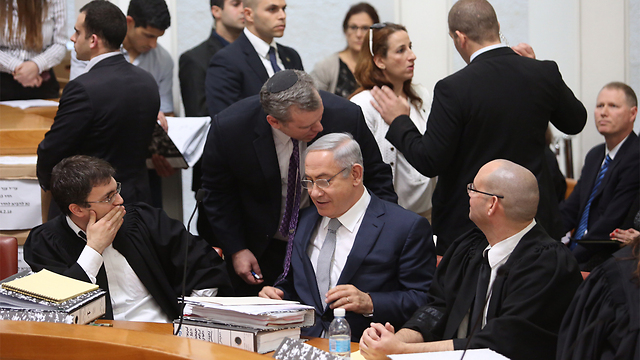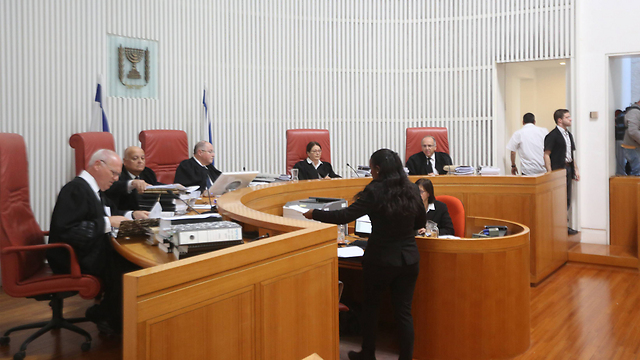Prime minister appears in court in unprecedented move, saying Israel had to act on its gas fields now, and arguing that ‘any further delay could lead to grave, significant and long-term damage to the State of Israel.’
In an unprecedented move, Prime Minister Benjamin Netanyahu arrived at the Supreme Court on Sunday to personally defend the natural gas deal signed in December with US and Israeli developers drilling offshore gas deposits, while the five justices deliberate on petitions against it.
The prime minister asked the judges to reject the petitions against the gas plan, warning that “with so many good intentions, we might miss a historic golden opportunity.”
While Netanyahu was delivering his testimony inside the courtroom, about 50 people protested outside. One wore a cape, a scepter and a mask of Netanyahu’s face, while another held a sign that read “selling the state.”

Israel announced the discovery of sizeable offshore natural gas deposits about five years ago. A partnership between Noble Energy and Delek Group, which is led by billionaire Yitzhak Tshuva, is the main developer at Israel’s two larger gas fields, Tamar and the heftier Leviathan. After the country’s antitrust commissioner determined the gas companies’ ownership constituted a monopoly, a government committee reached a deal with the firms to introduce competition.
Under the deal, Texas-based Noble Energy and Israel’s Delek Group, which discovered Leviathan in 2010, would retain control of the field but are being forced to sell other, smaller assets such as the nearby Tamar field that began production in 2013.
Critics, including the anti-trust authority, have argued that planned control of the country’s gas reserves by one consortium will limit competition and keep prices high.
Opposition parties Zionist Union and Meretz, and non-government organizations like the Movement for Quality Government in Israel and Adam Teva V’Din, filed petitions to block the deal because they said it favored the developers over the Israeli public.
Holding estimated reserves of 622 billion cubic metres, Leviathan will cost at least $6 billion to develop. It is meant to begin production by 2020 and supply billions of dollars worth of gas to Egypt and Jordan, and possibly Turkey and Europe.
The prime minister said that Israel was “at a critical point in time, both with regards to the risks and with regards to the opportunities relating to this issue. In the most concise way, we’re at the last minute with regards to our ability to realize the potential in the State of Israel’s gas reserves. As I’m about to elaborate, any additional delay, any backtracking, could lead to grave results that I doubt we could overcome.”
He argued the blueprint provided major opportunities for Israel’s foreign relations and significantly boost its economy, and noted that if Israel were to alter its deal investors could turn away and buy gas from Israel’s enemies instead.
Netanyahu said he had no intention of going into the legal arguments against the gas deal, noting he asked to appear in person in front of the extended panel of judges “to demonstrate the great importance I see in continuing the quick and smooth implementation of the gas plan. It’s important not just to the State of Israel’s economy, but also to its national security, its energy security and to our standing in the Middle East.”

He argued that there was “no realistic alternative to the approved gas plan and I’m anxious of the possible consequences of any further delay. It could lead to the collapse of the plan that has been formulated, which could lead to grave, significant and long-term damage to the State of Israel.”
The prime minister stressed that Israel “needed to create relationships of trust and long-term cooperation with international companies and foreign governments because developing the Leviathan field, much like other fields, necessitates massive investments of tens of billions of shekels. This requires long-term contracts to produce gas so we could fund the development of the gas fields.”
However, he noted, Israel’s rigid regulatory system has “undermined the trust of energy companies and the international banks that are supposed to fund the investments, as well as of those countries that are supposed to be the buyers of the Israeli gas. The development of the gas fields, much like the development of new gas fields, has completely stopped.”
“This isn’t another economic project,” Netanyahu said. “In order to develop gas that’s at a great depth of almost two kilometers under sea level, dozens of kilometers from the shore, that is a very complex operation that requires knowhow and expertise.”
The prime minister also defended the gas plan from claims that it was meant to help the wealthy and harm the rest of Israel’s citizens, saying that “A significant portion of the revenue from the gas plan has gone to the state, meaning to the citizens of Israel.”
“I’ve led many of the significant competitive reforms in the Israeli economy,” he went on to say. “I don’t need a push to promote competition and reduce centralization. I supported the gas plan because I realized that in this case, we are at a pressing situation and we do not have another realistic alternative. Without the plan, there will definitely not be any competition. I have no doubt about that.”
Last year, the Knesset narrowly approved the deal but the anti-trust commissioner resigned in protest. The deal still needed anti-trust approval or for the economy minister to sign a waiver to bypass the Anti-Trust Authority.
The minister, Aryeh Deri, refused and ultimately resigned and Netanyahu took over as economy minister. In December, he invoked a never-before-used clause in the anti-trust law that allows for decisions of the Anti-Trust Authority to be overridden in the name of security and international diplomacy.
“Until a year ago, I’ve allowed the different regulators to act independently, but the decision of the previous antitrust regulator to go back on a contract has led to a serious crisis of trust, almost irreversible, not just with the energy companies but also with the relevant countries.
“We had an agreement with the Kingdom of Jordan to sign a contract on the supply of Israeli gas (to Amman) and everything was ready, and then the surprising decision came to cancel the agreement. This was an important security, geo-political and economic contract. Had this contract been signed a year ago, it would’ve helped a lot to the economic stability of Jordan, which is facing the significant and difficult challenge of hundreds of thousands of refugees. It strengthens our relations of peace, relations that are very important to the State of Israel.”
Netanyahu had defended the deal in an affidavit to the Supreme Court last week and requested appearing in front of the judges before they make their final, binding ruling.
“This is the first time I’ve asked to appear in front of the court in the 10 years I’ve served as the prime minister. To the best of my knowledge, this is the first time in the history of the State of Israel that a prime minister asks to appear in front of the court,” Netanyahu said at the beginning of his testimony.
Energy Minister Yuval Steinitz was present during the prime minister’s testimony, as well as representatives of the petitioners: MKs Shelly Yachimovich (Zionist Union), Zahava Galon (Meretz), Ayelet Nahmias-Verbin (Zionist Union), Prof. Manuel Trajtenberg (Zionist Union), Eitan Cabel (Zionist Union) and Tamar Zandberg (Meretz).
As reported by Ynetnews
